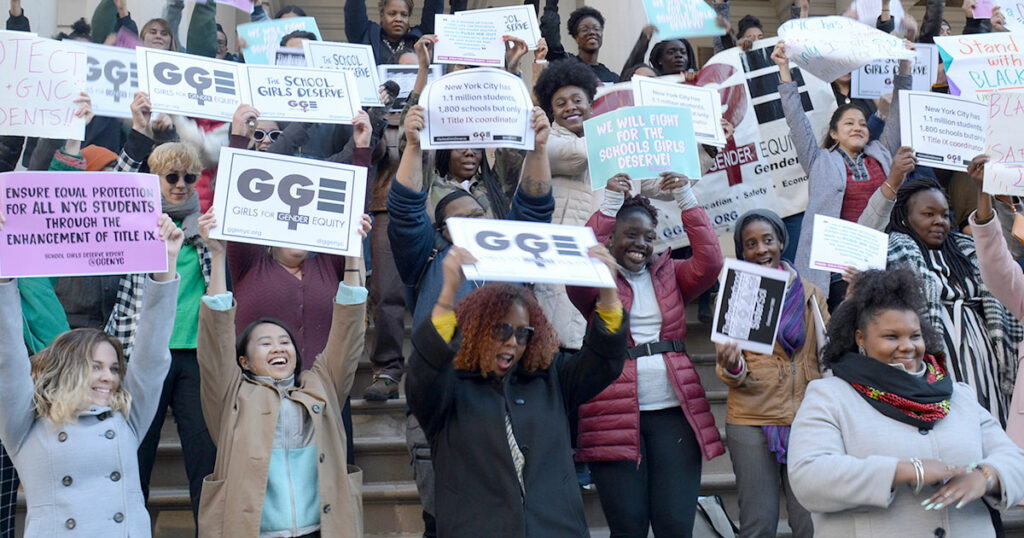Blog
Girls for Gender Equity: Twenty Years Building Power at the Intersections

For the last twenty years, Girls for Gender Equity has grown in just about every way imaginable. What began as a two-person operation became an organization with dozens of paid staff. What started as a focus on equity in sports became a dynamic, multi-issue group organizing across public education, health care, and criminal justice. GGE has helped build popular movements, nurture and train generations of youth organizers, and pass transformative legislation.
Founder and Executive Director Joanne N. Smith has guided GGE from its first days as a program based in a Brooklyn YMCA. As Smith wrote in 2016, GGE’s expansive vision comes from an understanding of the true nature of the challenges in front of them:
GGE’s experience working with girls of color, trans and gender nonconforming young people, in particular, has taught us that the global fight to ensure the basic right for all youth to receive a quality education and be contributing members of our growing democracy is urgent and not only a gender-based violence or reproductive rights issue but is also a school push out issue, school to prison pipeline issue, sexual assault to prison pipeline issue, gender-based violence issue, and school to the poverty pipeline issue.
Part of what makes GGE unique is its commitment to involving the youth they serve in determining organizational priorities. GGE’s 2016 The Schools Girls Deserve was a groundbreaking intergenerational report rooted in the lived experiences of more than 100 New York City public school students. The report deeply involved girls and TGNC (trans and gender-nonconforming) students of color in both its findings and recommendations.
One of GGE’s biggest victories came in 2019, when New York City agreed to dramatically expand the number of Title IX officers for public schools. Before GGE and coalition partners won, the city had only one Title IX officer for a district of more than a million students.
Since then, GGE has continued to be responsive to the changing educational and movement landscape, providing important data to inform the movement and training to support it. One of the key barriers to quality education that young people have identified is police in their schools. Data backed this up. In 2021, the organization highlighted that while police interventions in schools dropped dramatically during the pandemic due to mandatory closures, the school suspension crisis was still ongoing via remote learning. Over the previous five years, GGE found that while Black girls make up only 22% of girls in the public school system, they represented 57% of all school-based police interventions targeting girls.
But releasing data highlighting the problem isn’t enough: so GGE brought stakeholders together to build an alternative and a game plan for building it. The result is the 100+ page publication Sustaining Police-Free Schools Through Practice: A Toolkit for New York City School Communities and a series of video and PDF supplements to guide community action and policy change. While the primary focus is on New York City schools, the lessons within the report are useful for communities across the country.
And just last month, GGE held a virtual Police-Free Schools Bootcamp led by youth organizers from New York City, Los Angeles, and Chicago, to help train and support the movement’s next generation of leaders.
Intersectional, multi-issue work can be difficult to fund, thanks to a philanthropic culture that too often focuses on niches and makes donations with strings attached. “Philanthropy and the government must respond to the needs of the whole person, not parcel out funding for girls, racial justice, health care, school resources, immigration status, etc.,” Smith said. “Organizations need flexibility and general operating support to respond to movement moments like the pandemic when communities of color are especially hard hit.”
Schott is proud to have supported Girls for Gender Equity for many years, and during this important moment of transition for public schools and our society at large, we hope you’ll support them too.


